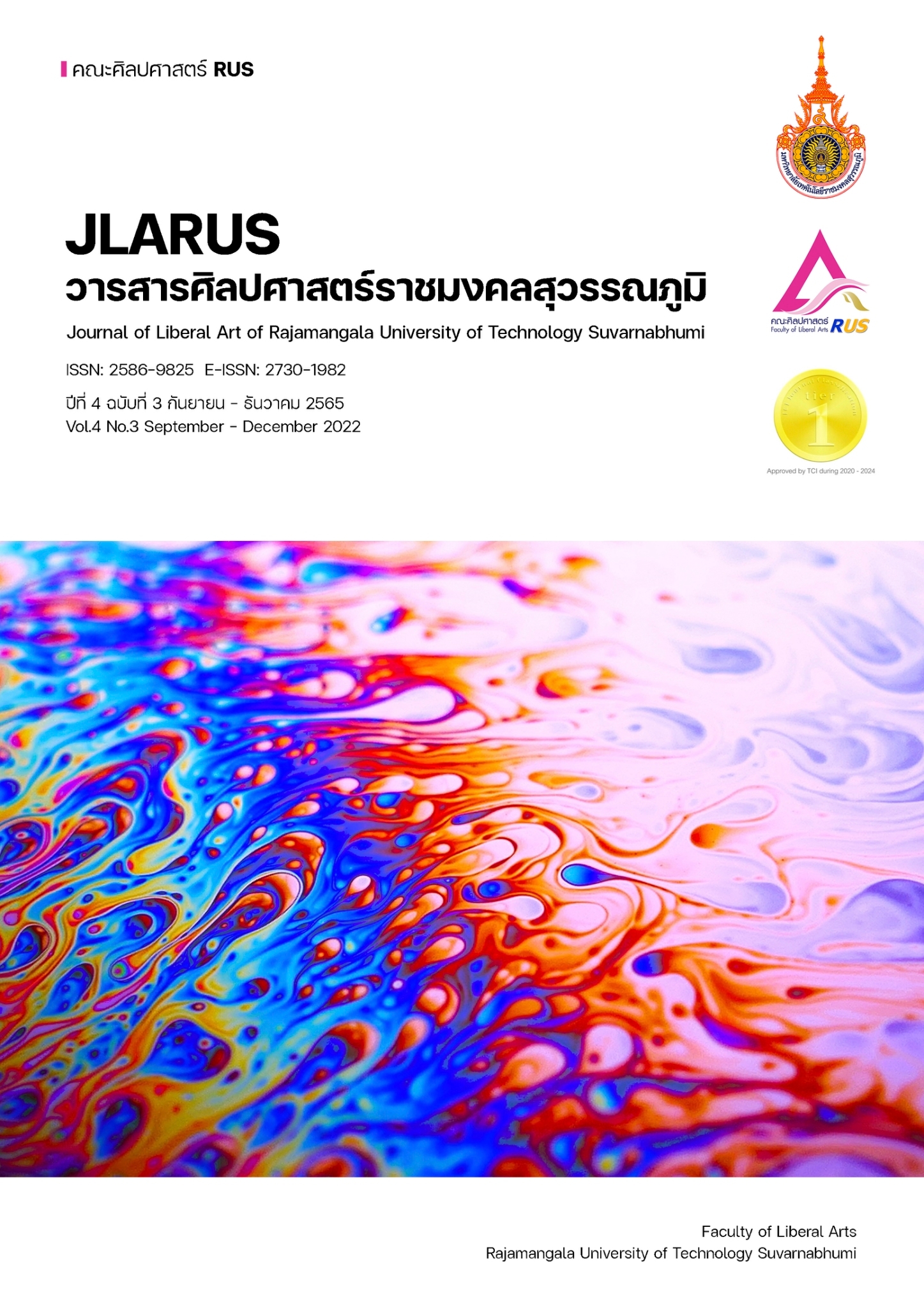KNOWLEDGE MANAGEMENT FOR DEVELOPING CREATIVE TOURISM STORY AND ACTIVITIES IN CHAINAT, SINGBURI AND LOPBURI PROVINCES
Main Article Content
Abstract
This research paper is a qualitative research with the objectives to (1) survey and collect local tales to develop creative tourism stories and activities at creative tourism destinations in Chainat, Singburi, and Lopburi provinces; (2) use the knowledge management concept to develop creative tourism stories and activities at creative tourism destinations in the three provinces; and (3) present knowledge management guidelines to develop creative tourism stories and activities at creative tourism destinations in Chainat, Singburi, and Lopburi provinces. The data collecting was conducted through in-depth interview, participant observation and brainstorming meeting. The data were analyzed by data type classification and theoretical event analysis. The study areas were communities, local entrepreneurs. and creative tourist attractions in Chainat, Singburi and Lopburi, in total 14 places. The results showed that all 14 studied areas had 57 local knowledges and stories that can be developed or extended. Such knowledge and stories can be divided into 6 groups: 1) history/myths, 2) lifestyles and beliefs, 3) food wisdom, 4) agricultural/herbal wisdom, 5) identity of local products, and 6) nearby landmarks that are connected to the 14 research areas. Extending or utilizing local knowledge can be carried out in 3 ways: 1) creating a short story or tale, 2) developing a creative tourism activity, and 3) creating a tale while taking a tour of the place or leading an activity. Tales and creative tourism activities can be developed by using a four-step knowledge management process: 1) identifying knowledge based on the needs stakeholder groups, 2) seeking knowledge, 3) creating and extracting knowledge, and 4) collecting knowledge in the form of websites and manuals for preparation for becoming a creative tourist destination.
Article Details

This work is licensed under a Creative Commons Attribution-NonCommercial-NoDerivatives 4.0 International License.
References
กรกนก นิลดำ. (2563). การสร้างเรื่องเล่าของแหล่งท่องเที่ยวเชิงสุขภาพในจังหวัดเชียงราย. วารสารนิเทศศาสตร์ธุรกิจบัณฑิต, 14(2), 109-135.
จุฑาธิปต์ จันทร์เอียด, อังสุมาลิน จำนงชอบ และณัฏฐพัชร มณีโรจน์. (2561). การพัฒนาการท่องเที่ยวเชิงประสบการณ์ในพื้นที่อำเภอวัฒนานคร จังหวัดสระแก้ว. วารสารศิลปศาสตร์ มหาวิทยาลัยสงขลานครินทร์ วิทยาเขตหาดใหญ่, 10(2), 156-187.
นรินทร์ สังข์รักษา. (2561). เรื่องเล่า: วิธีวิทยาแนวใหม่ในการแสวงหาความรู้เพื่อการวิจัยทางสังคม. วารสารศิลปากรศึกษาศาสตร์วิจัย, 10(2), 1-18.
นุชนารถ รัตนสุวงศ์ชัย, ภูริวัจน์ เดชอุ่ม และ อรช กระแสอินทร์. (2561). Local NEO SME หัวใจเก๋า คิดแนวใหม่ สไตล์ธุรกิจท่องเที่ยวเชิงสร้างสรรค์. ใน รายงานการวิจัย. กรุงเทพมหานคร: มหาวิทยาลัยเกษตรศาสตร์.
ปฐิมา บุญปก, หทัยรัตน์ ทับพร และอัควิทย์ เรืองรอง. (2562). การสืบทอดภูมิปัญญาเรื่องเล่าท้องถิ่น เพื่อพัฒนาวิถีชีวิตของชุมชนในแอ่งสกลนคร. มนุษยศาสตร์ปริทรรศน์, 41(1), 7-15.
ปนันดา จันทร์สุกรี, นลินี พาน, สายตา ไพลิน เชื้อหยก และนิตินัย รุ่งจินดารัตน์. (2560). การจัดการความรู้ด้านการท่องเที่ยวเชิงสร้างสรรค์: กรณีศึกษาชุมชนตลาดน้ำอัมพวา จังหวัดสมุทรสงคราม. วารสารวิทยาลัยดุสิตธานี, 1(3), 49-63.
รัฐวิชญ์ ชัยศิริพานิช. (2562). การศึกษา 5 เสน่ห์วิถีชุมชนที่มีผลต่อความจงรักภักดีของนักท่องเที่ยวตลาดนัดหัวปลี ศูนย์โอทอป (OTOP) คอมเพล็กซ์ พุแค ตำบลพุแค อำเภอเฉลิมพระเกียรติ จังหวัดสระบุรี (วิทยานิพนธ์ปริญญามหาบัณฑิต). กรุงเทพมหานคร: มหาวิทยาลัยศิลปากร.
สุกัญญา สุจฉายา. (2553). “เศรษฐกิจสร้างสรรค์กับการจัดการวัฒนธรรม”. วารสารไทยศึกษา, 7(2), 217-240.
สุจิตต์ วงษ์เทศ. (2549). สุวรรณภูมิ: ต้นกระแสประวัติศาสตร์ไทย. กรุงเทพมหานคร: มติชน.
สุดแดน วิสุทธิลักษณ์. (2558). องค์ความรู้ว่าด้วยการท่องเที่ยวเชิงสร้างสรรค์: คู่มือและแนวทางปฏิบัติ. กรุงเทพมหานคร: องค์การบริหารการพัฒนาพื้นที่พิเศษเพื่อการท่องเที่ยวอย่างยั่งยืน (องค์การมหาชน).
อภิลักษณ์ เกษมผลกูล. (2558). เรื่องเล่าพื้นบ้านกับการสร้างมูลค่าเพิ่มให้ผลิตภัณฑ์ท้องถิ่น (OTOP) ในบริบทเศรษฐกิจสร้างสรรค์. ใน ศิราพร ณ ถลาง (บรรณาธิการ). เรื่องเล่าพื้นบ้านไทยในโลกที่เปลี่ยนแปลง. กรุงเทพมหานคร: ศูนย์มานุษยวิทยาสิรินธร (องค์การมหาชน).
อรช กระแสอินทร์, นุชนารถ รัตนสุวงศ์ชัย และจริยา สุพรรณ. (2564). การพัฒนาการท่องเที่ยวเชิงสร้างสรรค์ของจังหวัดชัยนาท จังหวัดสิงห์บุรี และจังหวัดลพบุรี. ใน รายงานการวิจัย. กรุงเทพมหานคร: มหาวิทยาลัยเกษตรศาสตร์.
Alavi, M. & Leidner, D. (2001). Review: Knowledge Management and Knowledge Management Systems. Conceptual Foundations and Research Issues, 25(1), 107-136.
Davenport, M. (1994). “Understanding Knowledge Management”. Journal of Long Range Planning, 30(3), 374-384.
Heisig, P. (2009). Harmonisation of Knowledge Management-Comparing 160 KM Frameworks around the Globe. Journal of Knowledge Management, 13(4), 4-31.
Hjalager, Anne-Mette. (2002). Repairing Innovation Defectiveness in Tourism. Tourism Management. 23, 465-474.
Nonaka, I and H. Takeuchi. (1995). The Knowledge-creating Company: How Japanese Companies Create the Dynamic. New York: Oxford University Press.
Stambolis, Y. & Skayanis, P. (2003). Innovation Strategies and Technology for Experience-Based Tourism. Tourism Management, 24, 35-43.


